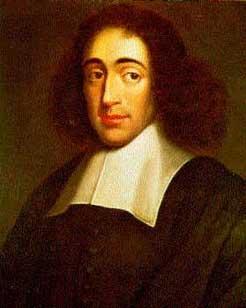Washington Spinoza Society
|
Some of my friends and I formed the Washington D.C. Spinoza Society in 2001 after taking a course on Spinoza at the local Jewish Study Center. Everyone in the class loved the teacher (Sidney Bailin) and found his class stimulating. When the class was over, a number of us agreed to keep on meeting. After first getting together at someone's house, and then at a restaurant, we finally found a home: the Washington, D.C. Goethe Institute. From 2001 until the fall of 2015, we met monthly from September through May at the Goethe Institute. Beginning in November of 2015, and continuing through the present, we have been meeting at public facilities in Washington, D.C. or Bethesda, Maryland. We meet on Monday nights, once a month, and our sessions begin at 6:30 p.m. and continue until roughly 8:30. If you wish to be put on our mailing list so that you can get the dates and descriptions of our sessions, please e-mail me at [email protected].
I can't thank the Goethe Institute enough for hosting our group for 14 years. It was so generous with its space and so supportive of our efforts. Essentially, we're a group of people who love philosophy generally, and recognize in particular the incredible wisdom of Baruch Spinoza (1632-1677), a Dutch Jew who was nearly universally reviled as the epitome of evil until the late 18th century, when Germans like Goethe adopted him as a secular saint. Our pitch to the Institute was very simple: just as we adore philosophy and Spinoza, so, too, did Goethe and many of his German contemporaries (e.g., Lessing, Schelling, Heine, Mendelssohn, Herder, Hegel and Nietzsche). If the spirit of Goethe were to haunt this Institute, we argued, he'd surely plead for the building to host a society that met in the name of his greatest hero, Spinoza. When our group meets, we often focus on topics aside from Spinoza. The only requirement of a presentation is that it involves philosophy. Spinoza believed that philosophy -- or "intellectual love," to use his words -- leads both to virtue and to contentment. Twenty-first century America is a highly un-philosophical society, and the consequences of that fact can be felt, for example, in the poverty of our political discourse. Surely, America can stand to be more philosophical. But as much as philosophy can offer a society, she offers her greatest gifts to the individual. Being one of the earliest (classical) liberals, Spinoza was typically speaking to the individual seeker of truth. And thanks to the teachings of philosophers like Spinoza, we students of the discipline have a wealth of treasures available to guide us in our personal searches. Our pastime might not be the most lucrative or popular activity, but I know of none that is more rewarding or practical. |
